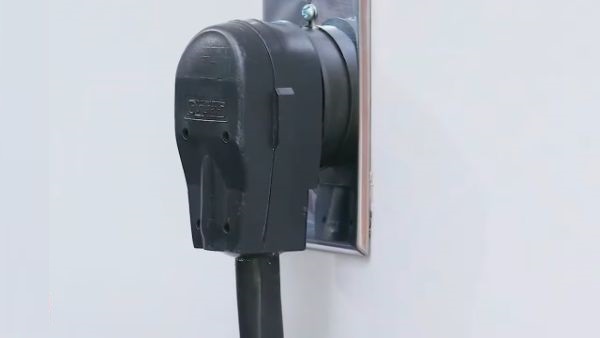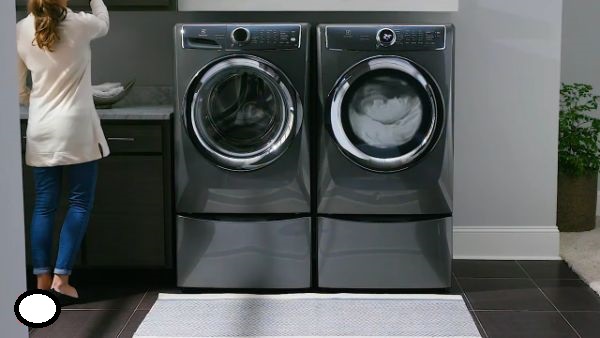Clothes dryers serve a pretty obvious purpose. When you’re shopping for one, you know one thing for sure: You want one that’ll get your clothes dry, fast – ideally without damaging them.
But if you’ve never bought one yourself, or if it’s been a while, you might not know there are two basic types: gas and electric dryer.
Have you ever looked behind your dryer to see what it runs on?
No worries if you haven’t. We’re here to help you figure out what you’ve got.
Or you might be starting from scratch, building a new home or laundry room.
Great. We’ll help you decide whether electric or gas dryer is best for your situation.
It’s similar to a stove. Both fuel types have pros and cons.
We’ll walk through them all.
Table of Contents
Why Check Your Fuel Source?
For starters, let’s identify whether your house is equipped for a gas or electric dryer.
Why?
Not checking the fuel source before buying a dryer is one of the most common mistakes customers make.
They’ll end up getting an electric dryer when their house is equipped for gas.
On the flip side, you might assume you have a gas dryer if you have a gas stove, but that’s not necessarily true.
How to Check Your Dryer Fuel Type
Confirming your fuel source can save you time, money, and a big headache come delivery day.
First, check your connection. Look behind your dryer.
Most electric dryers run on 240 volts, but gas dryers plug into a standard 120 volt outlet. 240 volt plugs tend to be noticeably larger and have an industrial-looking outlet.
If your home was built prior to 2000, it’ll have three prongs; after 2000, they have four prongs.
If your plug looks like these, chances are you have an electric dryer.
Gas dryers have a regular-size plug. You’ll also likely see a gas hose attached to the back – it tends to be yellow.
You can also take a look at your electrical panel. If the breaker for your dryer is a double slot breaker and it’s marked with 30 amps or higher, you’ve got an electric one.
Then, check your new dryer.
One surefire way to confirm if the model you’re interested in buying runs on gas or electric is to Google the model number. The model number usually appears on a silver sticker on the dryer door or nearby.
You’ll also find it on the spec sheet posted on the retailer’s website.
Now that you know what you’ve got, let’s talk about the benefits of electric versus gas dryers.
Which is better? We like to consider four factors.
Gas vs Electric Dryer
Which is More Efficient?
It depends.
Gas dryers generally do the job faster and use less energy. That’s because electric energy has to turn heat from a power plant into electricity, send it to your home, and then convert it back into heat to dry your clothes.
Gas simply combusts in your dryer and turns into heat. That’s much faster, and there’s almost no loss of heat in the process.
That also makes gas a more environment-friendly option.
The only exception would be if you produce your own solar electricity.
Which Costs Less Upfront?
Electric dryers. Their sticker price tends to be around $100 less than gas dryers.
Which Costs Less Over Time?
In the long term, gas dryers win. Because gas runs hotter than electricity, it cuts your drying time – and your electric bill.
According to the NRDC, gas dryers cost from 50 to 75 percent less to run than an electric dryer.
Which Dries Clothes Faster?
I already alluded to how gas dryers slash drying time.
Because they generate more heat faster, gas dryers win.
We often get asked whether you can convert an existing electric dryer to gas or vice versa.
The simple answer is no. They’re built differently.
If you’re buying a new dryer, It’s also a fairly involved project to run a gas line to your laundry room. However, if you want to switch from gas to electric, it’s not too labor intensive to have an electrician put in a 240 volt outlet.
Overall, gas dryers have more to recommend them.
They may cost more upfront, but they’re more energy and cost efficient, and they dry clothes faster.
Still, that doesn’t mean you should get gas line installed if you don’t have it.
Relatively few U.S. households, especially outside the northeast, have ready access to a gas line. Our advice? Switching from electric to gas makes sense only if you wash five or more loads a week and plan on staying in your current home for the next five years.
If that’s not the case, it’s not worth it. It’ll take at least two years to recoup your investment.


